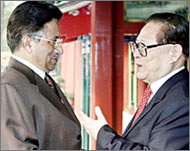China to respect property rights
China’s parliament has amended the constitution to protect private property.

Five decades after the Communist Party took power, nationalised private property and waged bloody campaigns against landlords, China’s parliament on Sunday amended the constitution to add the clause: “Private property obtained legally is inviolable.”
Analysts said the move reflected the party’s desire to maintain its grip on power while adapting to wrenching social change wrought by 25 years of economic reform that have made the private sector one of the key pillars of the booming economy.
But the landmark change was coupled with calls by Premier Wen Jiabao to parliament to help phase out taxes on poor farmers and find jobs for unemployed workers to help ease a yawning wealth gap between rich urban centres and the countryside.
Wen’s appeals – aimed at ensuring the party appeals to as broad a base as possible – were cornerstones of a work report approved overwhelmingly by the rubber-stamp National People’s Congress on Sunday.
Equal footing
The constitution, changed for the fourth time since its adoption in 1982, put private property on an equal footing with public property – a key plan to sustain economic growth.
“It is significant for a socialist regime that says it is still socialist or Communist to recognise more than before the role of the private economy in its development,” a Western diplomat said.
 |
|
Jiang Zemin (R) handed over the |
“It is significant that they decided to say that private property is as legitimate as public ownership,” he said. “It is in a way recognising that exploitation is good. It is a big
step.”
Warning of a widening wealth gap that Beijing fears could spark social unrest, Wen outlined in his work report steps to scrap farm taxes and boost subsidies in rural areas – home to 800 million people.
He also pledged to create nine million new urban jobs and re-employ five million workers laid off from state firms that are struggling to stay in business as the private sector blossoms.
Departure from Marx
Parliament also gave a further nod to the private sector by enshrining in the constitution the theories of Jiang Zemin, who handed over the presidency and top party post to Hu Jintao in a generational leadership change that started in November 2002.
Literally, the Three Represents theory says the Communist Party stands for advanced productive forces, advanced culture and the interests of the majority of the Chinese people. But the amendment is Communist code for opening the doors of the party to entrepreneurs once regarded as “running dogs of capitalism”.
|
“It is significant for a socialist regime that says it is still socialist or Communist to recognise more than before the |
“It is a departure from Marxism. It is also a recognition of Jiang Zemin thought after 13 years in power,” political commentator Wu Jiaxiang said.
Analysts say the amendment underscores Jiang’s residual influence, vaulting him into China’s pantheon of socialist greats. He has retained his post as chairman of the state Central Military Commission – China’s top military job.
His political theory was added to the party charter in November 2002, paving the way for entrepreneurs to join. The move to protect private property was unlikely to sit well with some ageing cadres and Communist Party stalwarts.
“There will be a few people who say ‘You are betraying Chinese socialism by selling out to the capitalists’,” said one Chinese analyst. “But they will be a very small few.”